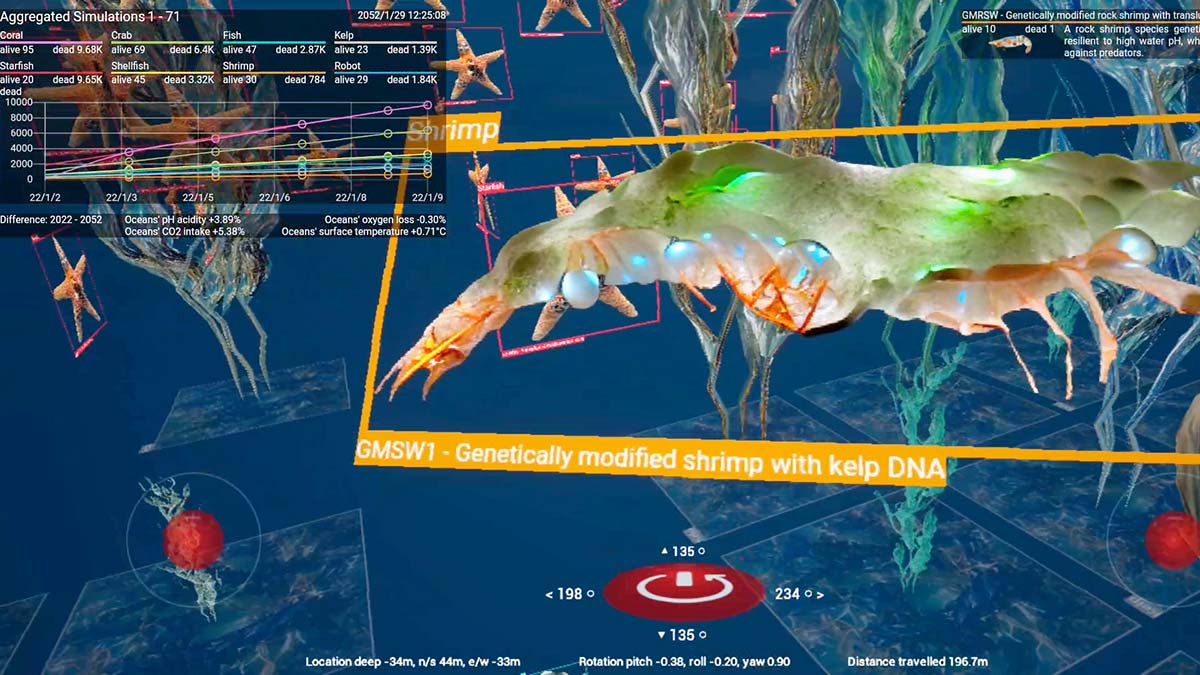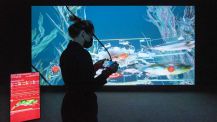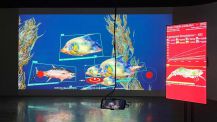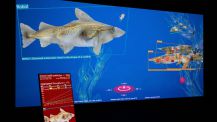1.5° CELSIUS
MSU Science Gallery, Michigan, USAKuratiert von: Curatorial Team MSU Science Gallery
Künstler*innen: Lisa Korpos, Anastasiia Raina, Hailey Becker & Kakia Gkoudina, Bioforcetech Corporation, Kristine Diekman, Lisa Mansfield, & Liz Waugh McManus, Vincent Ruijters & Ray LC, Raphael Arar, Kelsey Merreck Wagner, Eryk Salvaggio, Claudia Westermann, Vinny Montag, & Hao Liu, Lilia Li-Mi-Yan & Katherina Sadovsky, Gaurav Patekar, Harpreet Sareen, Franziska Mack, & Yasuaki Kakehi, Maxwell Oerther, Jinho Lee, & Ovya Venkat, Iris Qu, Marc Lee, & Shervin Saremi, Filips Staņislavskis

Screenshot, YANTO
1.5° Celsius Opens at the MSU Museum
The MSU Museum is presenting 1.5° Celsius now through February 25, 2023. The exhibition and its supporting programs imagine new ways of addressing the social and environmental issues connected to the global climate crisis. Join us for a public opening reception on Friday, September 9 from 6:00 – 8:00 p.m.
Through the contributions of national and international artists, scientists, and researchers, the exhibition addresses the global climate crisis across three key themes. These themes focus on the interdependence of all life, imagined futures, and sustainable solutions to combat the global climate crisis.
“We’re pleased to present this exhibition exploring one of the most urgent issues of our time,” states MSU Museum director and curator Devon Akmon. “It reinforces our new mission, strategic plan, and work towards serving our communities as a creative collaboratory.”
After reviewing over 175 open call submissions from around the world, the curatorial team selected 15 exhibits to include in the exhibition. Contributors include artists, researchers, and scientists from across the United States, The Netherlands, Japan, Russia, and the United Kingdom. 1.5° Celsius was curated by the MSU Museum’s new CoLab Studio. A division for innovation, the Studio’s timely and relevant programs are designed to be novel, transient, and experimental.
Additional curators for the exhibition include Abhishek Narula, Assistant Professor of Electronic Art and Intermedia & Experience Architecture in MSU’s Department of Art, Art History, & Design; Dr. Julie Libarkin, Associate Dean for STEM Education and Research and Innovation in the Office of the Associate Provost for Undergraduate Education; Dr. Mark Sullivan, Creative Director of MSU Museum CoLab Studio; Caroline White, Education & Learning Manger with CoLab Studio; and former MSU student Hadley Griffin.
Dr. Sullivan remarks about the exhibition, “For years, many have been responding to the ever-worsening climate crisis. I, like many, decided that response needs to become a priority. As the curatorial statement put it: “We are a few degrees from catastrophe.” To avoid irreparable damage to our climate, our ecosystems, and our ability to inhabit the planet, we must urgently consider the actions we need to take, individually and collectively, before it is too late. We need to imagine new ways to add to our response to the social and environmental issues connected to climate change, and act to build a brighter, more sustainable future.”
Fifteen exhibits will be on view in the Main Gallery at the MSU Museum. Additional exhibits will be embedded at the STEM Teaching and Learning Facility, MSU Main Library, and downtown East Lansing’s (SCENE) Metrospace. The CoLab Studio’s acclaimed CoLaborators will be stationed throughout the Museum’s Main Gallery to engage visitors in dialogue around the exhibition content. CoLaborators are a team of undergraduate and graduate students that spark thoughtful discussions, facilitate ideas, and infuse learning and creativity through MSU Museum exhibitions and outreach.
The exhibition kicks off with variety of interdisciplinary programs. The first is The Community Bee Clinic, a community-based art-science workshop where participants will learn all about honeybees and can become emergency caregivers for ailing bees. And, later in September, an outdoors screening of the acclaimed film WALL-E will take place in the W.J. Beal Botanical Garden. WALL-E is the story of a lone robot tasked with cleaning up mountains of garbage on an uninhabited Earth in the year 2850.
In sum, MSU Museum will present one dozen programs in conjunction with the exhibition, including a workshop where participants will collaboratively create a giant weaving made from plastic and recycled objects on a wooden tapestry loom. For complete exhibition information and to view the full virtual program schedule that includes lectures, workshops, and performances, visit: museum.msu.edu.
1.5° Celsius
Through contributions of more than one dozen national and international artists, scientists, and researchers, the 1.5 ° Celsius exhibition and its supporting public programs explore the global climate crisis.
We are 0.4° Celsius away from catastrophe.
In 2015, the Paris Agreement outlined the need to substantially reduce greenhouse gas emissions to limit global temperature increase to no more than 1.5° Celsius above pre-industrial levels. This goal aims to avoid irreparable damage to our climate, our ecosystems, and our ability to inhabit the planet. Failure to do so may cause disastrous calamities including extreme weather events that impact everything from our ability to grow food to accessing fresh water.
Currently, the global temperature increase sits at 1.1°C. Therefore, we must urgently consider the actions we need to take, individually and collectively, before it is too late.
In this exhibition, we invite you to examine the scope of our impact on the planet and the ways that our lives are deeply interconnected with the well-being of the environment. We hope that you will start to imagine new ways of addressing the social and environmental issues connected to climate change, and how we can build brighter, more sustainable futures.
FEATURED EXHIBITS
The Community Bee Clinic
Lisa Korpos
Portland, OR
Urchin Futures
Anastasiia Raina
Providence, RI
What Are We Made Of?
Hailey Becker & Kakia Gkoudina
Lansing, MI
OurCarbon: Carbon Negative Base Material
Bioforcetech Corporation
San Francisco, CA
1.5 Degrees of Concern
Kristine Diekman, Lisa Mansfield, & Liz Waugh McManus
USA, Australia, & UK
CHIKYUCHI
Vincent Ruijters & Ray LC
The Netherlands & USA
An Ecological Oracle
Raphael Arar
Portland, OR
Loom & Doom: Weaving Against Plastic & Climate Change
Kelsey Merreck Wagner
East Lansing, MI
Appetite for Deconstruction
Eryk Salvaggio, Claudia Westermann, Vinny Montag, & Hao Liu
Rochester, NY & Suzhou, Jiangsu, China
A000000000001000AA011
Lilia Li-Mi-Yan & Katherina Sadovsky
Moscow, Russia
Feeling Climate Crisis
Gaurav Patekar
Boston, MA
Algaphon
Harpreet Sareen, Franziska Mack, & Yasuaki Kakehi
USA, India, Japan; USA, Germany; & Japan
Soil’s Relationship with Energy
Maxwell Oerther, Jinho Lee, & Ovya Venkat
East Lansing, MI
YANTO – yaw and not tip over
Marc Lee, Iris Qu, & Shervin Saremi
Zurich, New York, & Berlin
Human-Cloud Project
Filips Staņislavskis
Riga, Latvia
Ausgestellt
YANTO - yaw and not tip over
Mobile App als Interface für interaktive Kunst-InstallationenInfolge zunehmender Versauerung und industriellen Aquakulturen werden unsere Ozeane zunehmend unbewohnbar. Aquakulturarbeiter, Veterinäre und Wissenschaftler setzen nun auf Gentechnik, synthetische Biologie und maschinelles Lernen als potenzielle Instrumente zur Eindämmung des Klimawandels. YANTO - yaw and not tip over stellt sich eine spekulative Aquakulturfarm in 30 Jahren vor, in der künstliche mehr …

HEK, Basel

S-Factory Seongsu, Seoul

HEK, Basel